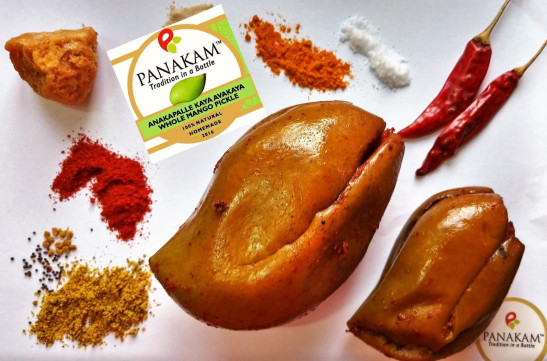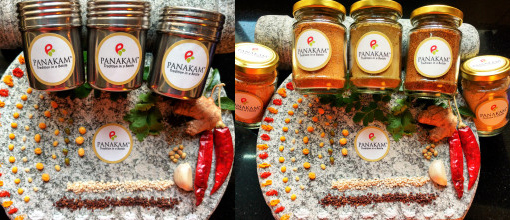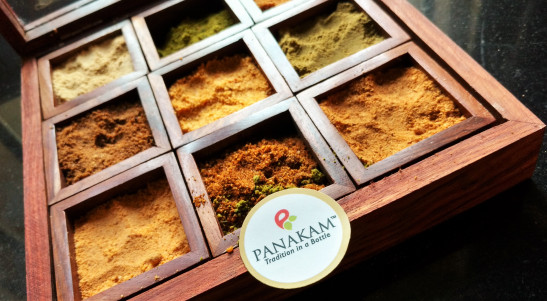Food |
October 19, 2017
Meet The Maker: Chinmaya Arjun Raja, Panakam – Tradition in a Bottle, Chennai
We chat up with Chinmaya Arjun Raja, a home chef, pickle maker and founder of Panakam – Tradition in a Bottle a home based food venture that makes heirloom pickle recipes and spice condiments. Chinmaya talks about his Pickling memories and inspirations behind his venture. He also shares with us his new array of products to be introduced at the By Hand From The Heart Makers Market in Chennai.
Why pickling?
I have always been fascinated by the diversity of India’s culinary traditions. Pickle is an important aspect of Indian traditional food. I have myself been a part of the annual summer Pickling ritual. As a kid, I keenly observed the process followed by my grandmother, mother and other members of the extended family and later participated in the pickle making process by helping them dry the mangoes and mixing the various spices. A huge quantity of Pickles was made every year to be distributed as Gifts to friends in India and abroad. I have always been a big lover of these homemade pickles and used to take them for my own consumption and to be given as Gifts during my frequent travel in India and abroad. Pickle was one of the most interesting aspects of traditional Indian cuisine which I could showcase to people interested in Indian Food.
Many of my European friends who are well-known Chefs and wine makers always loved my pickles. I used my Pickles to make my friends get a taste of Indian Culinary traditions. Regular travel in Europe and having Chefs and winemakers/sommeliers as good friends helped me to further my interest about different cuisines, fermentation techniques, tastes and flavours. Traditional Indian Pickles was a great showcasing product during my travel abroad. I wanted to go back to one’s traditional roots to get inspiration to do something different.
Apart from my interests in Wines and the Wine Appreciation sessions which I regularly conduct, I always wanted to do something with Traditional Indian Food. The first thing that came to my mind was Pickles. I wanted to bottle my childhood memories associated with the pickle making ritual. Having tasted Pickles made all over India, both homemade as well as mass-produced Pickle brands, my idea was to bottle only homemade traditional pickles made by traditional families who have been continuing this family and community tradition.
As with my wines and food, I was always interested to know “the person behind the product” I wanted to give importance to the name of the person or family behind the product and their culinary history. So when I finally decided to start some initiatives related to traditional Indian food, Pickles were the first thing to come to my mind. So launched “PANAKAM – Tradition in a Bottle” and started bottling our own Mango Pickle called RAJAPALAYAM MANGO PICKLE with mangoes sourced from our own Mango groves in our native Rajapalayam. My mom is an inspiration as well as she is a very good cook. The whole family participated in this initiative. We together bottled our own family/community pickle, 100% Natural and Homemade. I will also call it a “family made” pickle. I think we should involve the whole family in these traditional culinary rituals.
Culinary tradition is also a part of the Cultural heritage and it has to be safeguarded for future generations. Pickling is a tool to remember our culinary history and heritage. My idea is to select such families who are continuing to make traditional pickles and make such pickles and other traditional products available through Panakam – Tradition in a Bottle. We already have 3 such families and we are in the process of finding more.
I am in the process of researching and documenting the Pickle making traditions of different communities and regions of India and selecting families to bottle their traditional pickles and other products.

Pickling at Panakam – Tradition in a Bottle. What’s involved? Could you run us through the process?
All the offerings under “Panakam–Tradition in a Bottle” brand are homemade by families continuing their traditional culinary heritage. We don’t use any preservatives and add colours or flavouring agents. It is 100% natural. We just follow the traditional process passed down through generations. We share what we have been cooking and eating at home.
Mangoes are available only during the summer months and it’s a challenge to make large quantities of sun-dried mango pickle at home for the whole year in just a few weeks. Most of our Mango pickle varieties are sun dried and weather plays an important role. I make sure I keep myself free during the summer months from all my other initiatives and concentrate only on Pickles. The mangoes are sourced from our mango groves. I am present at my native Rajapalayam when the mangoes are harvested at the farm. All the other ingredients are sourced locally as well with the help of my family and my extended family members. I make sure I am involved in all the process to keep tab on the quality of all the ingredients. I carefully select and approve the mangoes to be used. I cut the mangoes along with other family members and a few assistants whom we employ. All the mixing of various spices is done by me and my mom for the Rajapalayam Mango Pickle. I take care of the whole sun drying process. The pickling process of our different sun dried mango pickles takes 2-3 weeks. It is elaborate and time consuming and a lot of patience is needed Pickling needs constant attention. After the pickling process, we need to make sure it’s stored well. It has to be examined periodically and stored for a few months before bottling. Bottling is done hygienically in glass jars/bottles.
For the Anakapalle mango pickles, the mangoes and the ingredients are sourced from Andhra Pradesh and members of the Vedula/Saripalle are involved with the Pickling process and I make sure I am present during this process as well and handle all the sun drying part of this pickle.
Similar process is followed for other types of Pickles and the other new products like Podi’s & Chutneys.
Since the start of Panakam – Tradition in a Bottle in 2014, I cancel all my travel plans and other projects and take care of only the Pickling process during the summer months of April, May and June. Me with my Mom at our Kitchen Madhuri Saripalle & Family of Anakapalle – AP
The myths on Indian pickles, spices & condiments.
Pickle is part of the Indian Culinary tradition. It was developed to naturally preserve a few vegetables and fruits using a lot of trial & error approach and research done by previous generations to perfect the process. New spices which came to India through the Europeans created new flavours when it was used for Pickles and it was quickly adapted. Innovations have been taking place in Indian Culinary traditions in the past to suit the climatic conditions and healthy eating practices.
Indian Pickles made the traditional way at home are very healthy. Sun Dried Pickles has very less salt and oil content. Some Traditional pickles go through a fermentation process which is probiotic too. Spices used in our culinary traditions are very healthy which we all know.
Traditional home-made pickles made with rightly sourced quality ingredients with no added preservatives, colours or flavours are one of the healthiest parts of Traditional Indian meal. You just need to follow traditional know-how!
It is much healthier than many sugary & salty food and beverages consumed regularly!
Mass factory produced pickle brands use a lot of salt with added preservatives, colours and flavours. It is not healthy if consumed regularly.
It’s a problem not just with factory made Pickles but homemade Pickles as well. Pickles get too spicy and Oily with extra use of Chilli powder, salt and oil. You get to taste only the chilli and salty flavour. This happens not just with some homemade pickles but in some of the South Indian food items as well. Too much chilli and other spices ultimately remove the flavour out of the vegetables and the main ingredients in a dish. Most of the Pickles are too salty, hot and oily.
Awareness is growing and there are many home based food products trying to make and market healthy traditional food products with a proper balance of spices.
Balance of spices is very important for a flavourful and healthy Pickle. We at Panakam – Tradition in a Bottle try to get this balance in our product experiences. The method used in our pickling process combined with quality ingredients and care taken to put everything together by the Pickle maker, makes it healthy and natural.
What are your biggest challenges?
There are quite a few challenges for a home based food venture as the entire family has to be involved. Kitchen has to be clean and hygienic. Retailing of these homemade products is challenging too as the margins demanded by some retail outlets are sometimes too high. The cost of such homemade products is naturally more than the mass-produced labels which can be picked from any market.
It is a challenge to educate people about pickles and the difference between homemade pickles and factory made pickles. It is difficult to convince them that Pickles need not be always spicy, salty and Oily.
It is also challenging to convince people to believe pickles can be healthy if made properly. People don’t think twice to spend money on an imported factory made product with all added colours, preservatives and flavours and made thousands of miles away. But hesitate to spend on something traditional, healthy and made locally by families following their culinary traditions passionately.
What are you bringing this time to BHFTH?
Apart from our popular heirloom pickles like Rajapalayam Mango Pickle, Anakapalle Endaavakaya Mango Pickle, Gooseberry, Lime, Kadarangai (Citron) pickles, vadams etc we have also started making the rare Kaya Avakaya Whole Mango Pickle made in some parts of Andhra Pradesh. It is an elaborate and time consuming process pickling sun-dried whole mangoes. This will be a Limited Edition & Made to Order pickle.

ANAKAPALLE KAYA AVAKAYA WHOLE MANGO PICKLE – Limited Edition & Made to Order
Selection of Spicy Powders – Podi’s for Accompaniments to South Indian Tiffins and Rice.
We have also launched around 10 different types of Podi’s (Spicy Powder/Gun Powder) to be used as an accompaniment to various South Indian tiffin’s like Idli, Dosa, Idiyappam and also with hot steamed rice with a dollop of Fresh Ghee. All the Podi’s are homemade by different families. They are 100% Natural with No Added preservatives, colours or flavours.
Apart from the popular Dal Podi’s, Curry leaves Podi, Coriander Podi, Sesame Podi, Idli Milagai Podi, we also have a unique & healthy Spicy Moringa leaves Podi (Drumstick leaves).

Launching of Panakam – Tradition in a Bottle’s TheMadrasBox:
“TheMadrasBox – Traditional South Indian Goodies” is an assorted gift box with Traditional South Indian Goodies like Pickles, Podi’s, Vadams, Chutneys and Syrups. This will be an ideal gifting option for giving someone a colourful & flavourful panorama of Traditional Homemade South Indian Food accompaniments. It can also be a good travel pack while travelling abroad.
All the “Panakam -Tradition in a Bottle” products will be available to pick and choose for this assorted Gift Box. It can be an assortment of just Pickles or Podi’s or Chutneys and it can also be a mix of all the products.

“TheMadrasBox – Traditional South Indian Goodies” comes in different packing options and combinations. It can be packed either in traditional small Stainless Steel containers or in glass jars and the assortment of these can be packed in a traditional Stainless Steel Spice box or in specially made and aesthetically designed corrugated paper boxes or in a wooden spice box.
Today’s Gift boxes are filled only with all types of Imported foods and factory produced mass food products. We at PANAKAM – Tradition in a Bottle want to offer homemade Traditional South Indian Goodies, as a popular and healthy Gifting option.
What’s the best piece of advice you’ve gotten along the way in building your business?
I have been following my instincts and getting constantly inspired by our traditional culinary creations right from the start of my creation of PANAKAM – Tradition in a Bottle and along the way… I want to get the basic principles right and make sure we follow the path which was originally planned – to offer unique and quality traditional food products from the kitchens of families continuing their respective culinary heritage passed down through generations. I started this initiative to document these unique traditional products and not as a pure business proposition. But I am now convinced that it is a good & healthy small business venture with a lot of potential.
I have been getting a lot of advice from different people. But I have always let my passion and instinct to decide. My immediate family and extended family members have been a big support to my initiative and I always go back to them to get my advice and to get my passion and instinct validated.
You have participated in an earlier edition; what was your BHFTH experience?
We participated in two editions of BHFTH in 2015 and it had been a great learning experience. It was the first such experience for us. People who experienced our unique offerings at BHFTH have been our loyal customers and encouraged us to continue and do more…
It was also a great experience to interact with other artisans from all over India who exhibited their products as well. It was a professionally well-managed market.
What advice would you give to other food entrepreneurs?
Go back to your roots and get your inspiration. Use technology and modern infrastructure to supplement /compliment your traditional knowledge. We need to eat right and be conscious of not just what we eat but also conscious of how it is made and who makes them. Eat local and make friends with local people and get yourself taste their homemade food.
